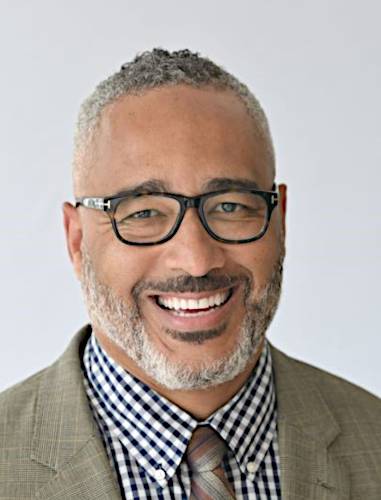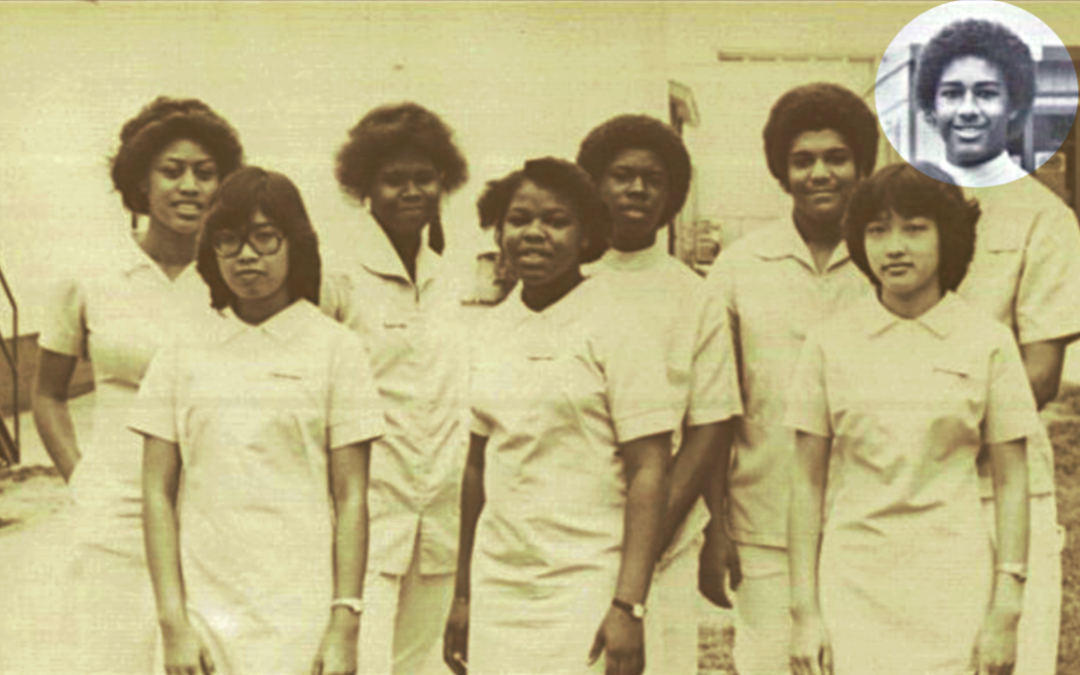“You know, when I was in nursing school, I never saw anyone that looked like me as an instructor.” Erik Carter, PhD, MS, APRN, CNS, CCRN-A, PHN, director of undergraduate programs for the Wayne State University College of Nursing, recalls “thinking it would be nice, at some point in my career, if I could be a face that students could see in themselves and say, “Hey, wow, that could be me one day.”
Carter – who teaches the college’s transition to practice class and is currently serving a three-year term as a human rights commissioner for the City of Detroit – was barely old enough to drive when he launched his career.
 The California native became an LVN at 17 after completing a program in high school, and by 1990 he had earned his RN as a public health nurse. Carter caught the teaching bug about 10 years later while working as an acute and critical care cardiovascular nurse in San Fransisco. Observing Carter sharing his experience with local students during clinical rounds, an impressed faculty member urged him to add teaching to his skill-set. The young man was soon dividing his time between bedside nursing and work as a clinical instructor at a community college.
The California native became an LVN at 17 after completing a program in high school, and by 1990 he had earned his RN as a public health nurse. Carter caught the teaching bug about 10 years later while working as an acute and critical care cardiovascular nurse in San Fransisco. Observing Carter sharing his experience with local students during clinical rounds, an impressed faculty member urged him to add teaching to his skill-set. The young man was soon dividing his time between bedside nursing and work as a clinical instructor at a community college.
About two years later, Carter’s career lanes started to merge after yet another impressed colleague – this time, an African American faculty member – encouraged him to join the growing ranks of melanin-enhanced nurse educators. It was an inspired idea, as “no one had ever asked me if I was interested in graduate work,” and BSN grads from California to Michigan are certainly glad that someone finally did pop the question.
However, long before there was a string of credentials following his name, Carter had just three letters to his credit: LVN. Below, he recounts his journey…
Why did you become a nurse?
My matriculation into nursing was a little bit different than the traditional route. I started my nursing career as a licensed vocational nurse. In high school, where I lived in Los Angeles County, a program offered interested and eligible students a portal into the health care realm. I applied for the program toward the end of my junior year. I completed the program in my senior year, with additional requisite courses that I took at night to fulfill my graduation requirements. After the program, I met the requirements and was able to sit for the NCLEX for vocational nurses, so that’s how I started my career in nursing. I was 17 at the time and had to wait until I turned 18 because they were unsure if a 17 year old should have access to drugs and dispensing narcotics; nevertheless, I became licensed and started work in long-term care after graduating high school.
“If you genuinely want to serve others in your community, nursing is one of the best ways to go about doing it.”
How did you get into teaching?
I worked at this hospital in San Francisco — California Pacific Medical Center — in a heart transplant unit. One of the local colleges had instructors who would bring students to our department. I loved having the students and sharing what I knew regarding nursing. One of the instructors observed all this activity happening between myself and the students, so I was approached and asked if I would be interested in being a clinical instructor. So, I applied to the college and became a clinical instructor for this community college nursing program on top of my regular bedside nursing position.
“‘Have you ever thought about going back to grad school?’
It was a surreal question, as no one had ever asked me if I was interested in graduate work, nor did I think it was an option for myself.”
A couple of years into that program, I met another African American faculty member working there. He was completing his Ph.D. at the University of California San Francisco. We just started having a conversation, and he said, “Have you ever thought about going back to grad school?” It was a surreal question, as no one had ever asked me if I was interested in graduate work, nor did I think it was an option for myself. In high school, this conversation never took place.
I hadn’t actually, but I thought about it for about a month or so, and I said, “You know, when I was in nursing school, I never saw anyone that looked like me as an instructor.” I remember thinking it would be nice, at some point in my career, if I could be a face that students could see in themselves and say, “Hey, wow, that could be me one day.”
You were appointed last June as a human rights commissioner for Detroit District 5. How did that come about?
The Human Rights Commission falls under the auspices of CRIO, which is the Civil Rights, Inclusion & Opportunity Department for the City of Detroit. I know the director — she’s a friend of mine — and we often have conversations. One day, I talked about wanting to do more within the community. As a faculty member of the College of Nursing, there’s a trifecta that includes teaching and scholarship and the element of service to the nursing profession and the communities that we serve.
“One day, I talked about wanting to do more within the community…”
At Wayne State, I’m charged with training students to become nurses to provide care for those who live within our community. I was trying to think of a way I could connect these endeavors, and she said, “Well, have you ever thought about being a commissioner for the Human Rights Commission in your district?”
I started thinking about it and was like, Yes, I can see that connection. So, we had further conversations. I had to be interviewed by the Detroit City Council, and they agreed that this was a good fit, and I was appointed as a human rights commissioner for District 5. To be part of the commission, you must live within that district, and we live in the downtown area, which encompasses District 5.
What are your responsibilities with this appointment?
Primarily, [the commissioner] is the point person for constituents who want to get information on equal economic, political and educational opportunities so that all have equal access. When I was reading through the charter, the part that stuck out to me was access to educational opportunities. For me, it always goes back to representation. We’re an urban university nestled in Detroit, which is a large percentage, I would say 80%, African American — but when you look at our nursing cohorts admitted into our programs, they are an underrepresented population, so I am trying to think of a way to increase potential nursing students’ admission into our programs and how that connects to that charter and my role as a human rights commissioner in Detroit.
We are still in a pandemic. Why should people consider a career in nursing?
I think the exact reason you would come into nursing if there were not a pandemic. If you want to offer something to your community in your heart of hearts, I think it speaks volumes to you as a human being to provide needed care to those who require it.
The nursing profession has tentacles that reach so many different areas of health care. You can begin your career in primary care and move to a community setting. After a couple of years, you can start in the med-surg department and transition into critical care. There’s just so much that you can do in this profession. If you genuinely want to serve others in your community, nursing is one of the best ways to go about doing it.



